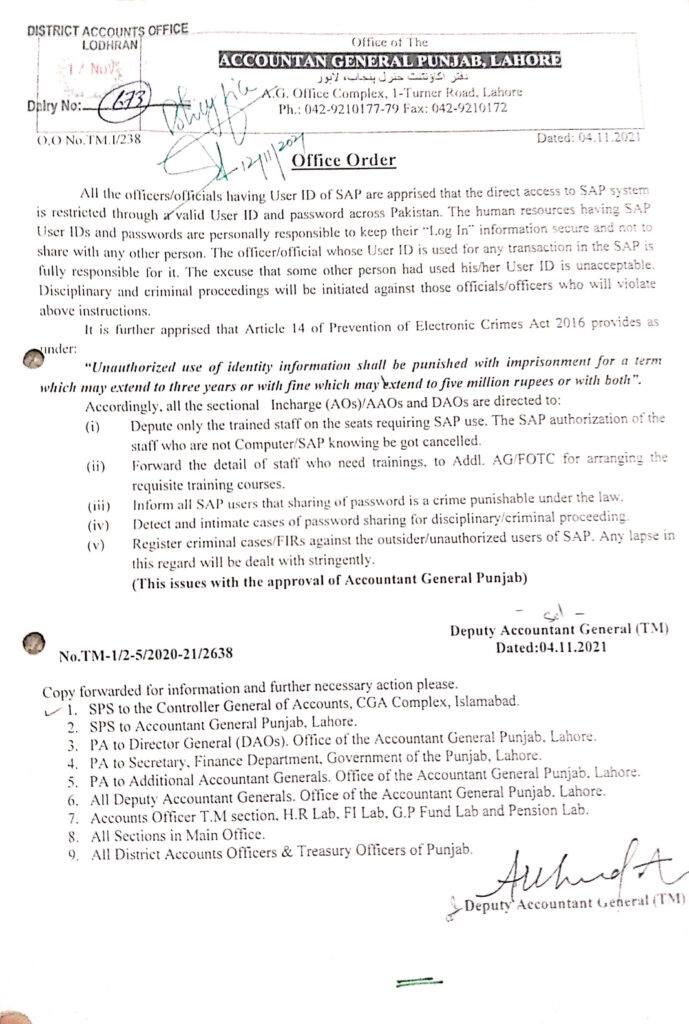
SAP User Password Sharing Implication –AG 04.11.2021
In recent directives issued by the Office of the Accountant General Punjab, the implications of SAP user password sharing have been underscored with seriousness. This directive highlights the critical importance of maintaining the security and integrity of SAP systems across all offices and departments. Let’s delve deeper into what this means for users and the consequences of non-compliance.
Importance of SAP User ID and Password Security
The SAP system serves as a vital tool for managing financial and administrative operations within government institutions. Access to this system is tightly controlled through unique User IDs and passwords assigned to authorized personnel. These credentials ensure that only authorized individuals can perform transactions, access sensitive data, and execute administrative functions within the SAP environment.
Directives and Restrictions on Password Sharing
According to the latest office order dated 04.11.2021, all officers and officials with SAP User IDs are strictly prohibited from sharing their login credentials with any other individual. This directive aims to prevent unauthorized access and misuse of the SAP system, safeguarding sensitive financial information and maintaining audit trail integrity.
The responsibility for safeguarding SAP User IDs and passwords lies solely with the assigned users. They are accountable for any transactions or activities conducted using their credentials. The order explicitly states that any claim of unauthorized use or password sharing will not be accepted as an excuse. Violation of these directives may result in severe disciplinary actions, including criminal proceedings as per Article 14 of the Prevention of Electronic Crimes Act 2016.
Legal Ramifications of Unauthorized Access
Article 14 of the Prevention of Electronic Crimes Act 2016 stipulates strict penalties for the unauthorized use of identity information, including imprisonment for up to three years, a fine of up to five million rupees, or both. This legal framework underscores the gravity of unauthorized access to systems like SAP, emphasizing the need for compliance with security protocols and guidelines.
Ensuring Compliance and Mitigating Risks
To enforce these directives effectively, the Office of the Accountant General Punjab has mandated several key measures:
- Training and Authorization: Only trained personnel are authorized to access SAP functionalities. Those lacking adequate training are not permitted to use SAP, and their authorizations are subject to cancellation.
- Training Requirements: Detailed lists of staff needing SAP training must be forwarded to the Additional Accountant General for organizing appropriate training courses. This ensures that all personnel handling SAP systems are proficient and aware of security protocols.
- Disciplinary Actions: Instances of password sharing or unauthorized system access are to be reported promptly. Disciplinary actions, including criminal proceedings, will be initiated against both internal personnel violating protocols and external unauthorized users attempting to access SAP systems.
Conclusion
In conclusion, the directive on SAP user password sharing from the Office of the Accountant General Punjab serves as a critical reminder of the importance of cybersecurity and data integrity. By strictly adhering to these guidelines, government institutions can mitigate risks associated with unauthorized access, protect sensitive financial information, and uphold the trust of stakeholders. Compliance with these directives not only safeguards against legal repercussions but also reinforces a culture of accountability and responsibility in managing digital assets.
As government agencies continue to digitize and streamline operations through SAP and similar systems, adherence to cybersecurity best practices remains paramount. It is incumbent upon all SAP users to uphold these standards diligently, ensuring the continued efficiency, security, and reliability of financial and administrative operations.

